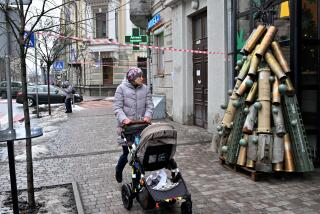Parent Needs to Give Love as Well as Gift
- Share via
Doug was happy for his former wife when she fell in love and then married two years ago. But his happiness was short-lived when he realized that her new husband was able to lavish gifts on their two teen-age sons that he couldn’t equal--surfing trips to Hawaii and expensive sports cars.
Debra’s sons, ages 4 and 6, don’t know that their errant father--who pays them only sporadic visits--never buys them presents. Instead, he unpredictably arrives during the holidays laden with toys he pretends to have chosen, but which are bought and paid for by the man’s parents.
Don makes a point of shopping early every Christmas, making certain he finds just the right gifts for his two daughters, ages 8 and 11. But he always walks away feeling outdone by his former wife and her live-in boyfriend. He can’t help feeling resentful that a man he considers little more than a stranger spends unlimited hours with his children.
The holiday season is promoted as a unique opportunity for parents to watch children beam with joy as they open carefully selected presents. But for single parents attempting to strike a delighted chord in their children, special occasions often miss the mark.
“I see a lot of sadness surrounding the holidays,” says Marche Isabella, an Irvine marriage, family and child counselor. “Tugs of war go on between former spouses competing for a child’s love.”
Although Doug earns a good living as a civil engineer, he cannot compete with gifts from his teen-age sons’ stepfather, a corporate president. But that doesn’t stop him from trying. “My self-esteem and ego have taken a real beating,” he says. “I know my kids love me, but if they have the choice of hanging out with me in Santa Ana or skiing in Switzerland, which do you think they will choose?”
Isabella, who is the director of Irvine Family Psychological Services, says that parents frequently overextend themselves to impress a child--only to find that they don’t get the desired effect.
She cautions: “Children often learn to be master manipulators when parents attempt to buy love. A system is set up of earning love through material things, as if to say, ‘Look at all I’ve done; you owe me.’ ”
She believes that divorced parents should concentrate on developing quality relationships with children instead of trying to play Santa Claus.
Most children are dazzled by expensive gifts, according to the counselor. But she reminds parents that once the novelty wears off, the child is left with the quality of the parent-child relationship.
She urges single parents to nurture that relationship. “The best thing a parent can do,” she says, “is to make a concerted effort to spend as much time as possible with a child--helping with homework or just listening, letting him know you are there in ways that really matter.”
For Debra, knowing that her former husband is capable of contributing is painful, but for now she is protecting her young boys. “Sure, it hurts to know that he can afford to buy the kids presents and doesn’t.”
But the Anaheim woman believes it would be a mistake to go into debt in an effort to make up for the deficit. “I can only do so much, and I do what I can. We always have a nice tree, and we spend time together. I don’t go overboard financially--I won’t put myself under that kind of pressure.”
Debra feels lucky that her boys have grandparents, aunts and uncles who are generous during the holidays. But she wonders how her kids will react once they learn it is their grandparents who buy them presents--and not their dad.
“Debra is wise to protect her children from the truth,” Isabella says. She advises parents to support a former spouse whenever possible. “Children will discover those shortcomings soon enough.”
For Don, a Yorba Linda lumberyard manager, the holidays are more inconvenient than joyful. “The girls always seem to enjoy the gifts I give them, and I must say that my wife and her boyfriend do not deliberately compete with me. It’s just that they live with the kids--they’re in the loop--they know better what will please them.”
Isabella noted that holidays can be especially difficult for single parents because they are a traditional family time, symbolizing intact families. “Non-custodial parents often feel a loss of tradition--of family. The child’s world is now filled with new traditions, new belongings. It is a life that no longer includes the non-custodial parent on a daily basis--no matter how vigilant he or she may be about visitation.”
Don concurs: “I went through a period where I didn’t want to even see the kids--it hurt so much. But I have to give my ‘ex’ credit because she wouldn’t let me cop out. She insisted I see them.
“Most of the year I can handle visitation, but it’s tough during the holidays. She has them on Christmas Eve--Christmas day I pick them up. Just once I’d like to wake up on Christmas morning with my kids. Sometimes I find myself trying to make it up to them with material things.”
That’s not unusual, Isabella says. “Non-custodial parents will often go to great lengths to buy expensive toys and gifts--whatever excites the child--trying to make up for a lack of time together.”
She urges parents to keep striving for a quality relationship.
“I’ve never heard of a parent who on their deathbed said, ‘I sure do wish I had bought Johnny Nintendo when he was 9.’ Nor a son grieve for gifts not received--except, perhaps, the gift of time and love.”
More to Read
Sign up for Essential California
The most important California stories and recommendations in your inbox every morning.
You may occasionally receive promotional content from the Los Angeles Times.













